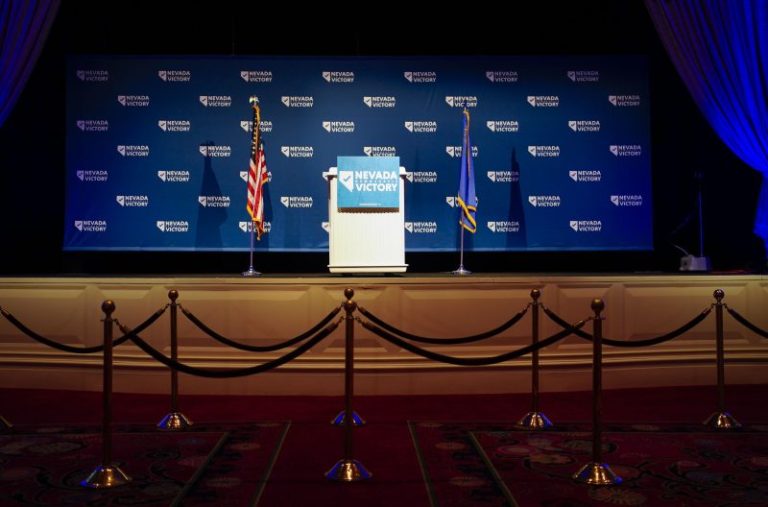Since Nevada instituted its half-cynical, half-furious “none of these candidates” option for election ballots about 50 years ago, the nihilistic choice has prevailed in only a handful of actual contests. Voters often use it as a way of expressing frustration about particular candidates or races as they complete the rest of their ballots; only rarely are there enough supporters of no one for no one to enjoy an actual victory.
Tuesday night’s Republican presidential primary is now part of that handful. The contest had no effect on the selection of the party’s nominee since, thanks to internal party fighting, it didn’t award any delegates. If it did, though, “no one” would have received about twice as many delegates as former ambassador Nikki Haley, the only one of the two remaining candidates in the contest to appear on the Nevada ballot.
Put another way: More than 42,000 Nevada Republicans turned out to vote in a meaningless contest solely to pick “no one” instead of voting for Haley. But those votes weren’t really for “no one” in this case. They were for “no one on the ballot” — or, more specifically, for Donald Trump.
Haley lost every county in the state. In every county, in fact, “no one”/imaginary Trump got at least half of the votes cast. On average, “no one” received 7 in 10 votes in Nevada’s counties. Haley’s best county was Washoe, on the state’s northwestern edge. There, she lost to no one by about the same margin as she lost to Trump in New Hampshire.
New Hampshire offers an interesting analogy, in fact. On the Democratic side there last month, President Biden didn’t appear on the ballot, providing his challengers, including Rep. Dean Phillips (D-Minn.), with an opportunity to make a statement.
Instead, Biden supporters launched a write-in campaign that earned the president nearly two-thirds of the vote. Phillips, who ran a real campaign, managed only 20 percent.
Nevada’s Republican primary was similar. Haley didn’t put any significant resources into the state, and she managed 31 percent of the vote rather than 20 percent. But she was swamped by a seemingly grass-roots effort to make a statement of support for the front-runner. Also, like it was for Phillips, the result was an embarrassment that sharpens questions about why she is pressing forward in the race.
How do we know that those “none of these candidates” votes were proxy votes for Trump? Well, beyond comparing the Nevada primary to New Hampshire’s, we can look at one of the most consistent demographic identifiers of support for Trump and Trump-endorsed candidates: education.
Of Nevada’s 17 counties, the ones with the highest percentages of residents who have a high school degree or less chose “no one” by the widest margins. The counties with the highest percentages of college graduates gave Haley her heaviest support.
Haley has pledged to stay in the race until her home state of South Carolina near the end of the month. There’s only one more contest before then, Thursday’s Nevada caucuses in which the state’s delegates will actually be awarded. Trump will clean up there, further pulling away from Haley in the race to clinch the party’s nomination. Perhaps Haley will stick around despite that.
That said, we should put a fine point on what happened Tuesday. It was understood that the contest was meaningless and won’t affect the nomination directly. But it also became a moment in which Trump’s supporters — a heavy majority of the party, as they have been for some time — sent an unsubtle message to Haley.
To wit: We are so committed to Trump that two of us will turn out to cast a meaningless vote for no one for every one of your voters.

